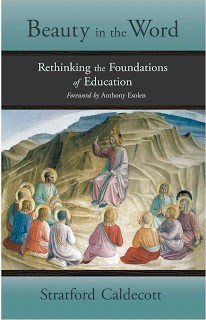Beauty in the Word
 Though Catholic schools are the ostensible audience, Stratford Caldecott’s Beauty in the Word is a thought-provoking read for anyone interested in the subject of education — or worried about current trends. The book explores the classical trivium and shares many insights into the nature of learning as well as the power of language, story and tradition. It’s a great read for anyone who needs a refresher on the purposes of homeschooling or other educational pursuits.
Though Catholic schools are the ostensible audience, Stratford Caldecott’s Beauty in the Word is a thought-provoking read for anyone interested in the subject of education — or worried about current trends. The book explores the classical trivium and shares many insights into the nature of learning as well as the power of language, story and tradition. It’s a great read for anyone who needs a refresher on the purposes of homeschooling or other educational pursuits.
I liked it partly because it presented to me some things I already believe. One is that stories are important — perhaps more important than the much vaunted “informational texts” that form an increasingly large proportion of the required reading in the common core. Stories matter because they link us to the past, they compress and layer meaning, and they provide us with the tools we need to creatively interact with our own lives, reorganizing our experience into narrative so that we can better understand it.
Caldecott draws many threads into his argument. In discussing the role of tradition, for instance, he considers the subtle alterations our technologies bring to our understanding of knowledge. Technology, he writes,
tends to eliminate tradition, and with it the possibility of a truly human living in time. If human memory and knowledge is evacuated into cyberspace, the past too becomes something we treat as external to ourselves, something other than us, something we sit back and observe… [as] a detached observer of the grid of knowledge, an insatiable consumer set loose in an infinite supermarket of information… The purpose of tradition is to serve the personal growth and development of man. But the purpose of the mechanical order that currently dominates education is for man to serve the growth and further evolution of the machine.
Sobering words, especially when we consider the heavy-handed presence of Bill Gates in promoting the common core. It sounds laudable to speak of developing software tailored to individual learning styles, but are we teaching children to think and master knowledge, or merely to be competent technicians, dependent on the rapidly changing and expensive world of I.T.? Better to educate in such a way as to help children recognize that they have a stake in a world of ideas much older than they are. Moral sensibility grows from this perspective.
I also liked Caldecott’s casting of the purpose of education as a conversion of heart and mind — a pursuit of the good, the true and the beautiful. It’s not to prepare us to do our share for the global economy. It’s not to fit us for a career and provide us with an income. It’s to make us more fully human in the way God intended us to be, and ultimately to pursue him — the source of all truth and beauty. As I read, I thought of the young Calormene warrior who worshiped Tash in Lewis’ The Last Battle. He recognized and loved the truth, and ultimately he discovered that he’d really sought Aslan all along. However relentlessly the modern world paves over our innate spiritual inclinations, we can educate in such a way as to encourage a love for truth and beauty. As Caldecott puts it, “The kind of education we want is one that fits us to know the truth that will set us free.”
I’ve only barely scratched the surface in this review. There was a good bit of discussion of some favorite authors in these pages — Tolkien, Lewis, MacDonald — that I’d like to reread. As I expected from the book description, there was a fair amount of discussion of Catholicism as well, but one doesn’t have to be Catholic (I’m Protestant myself) to find much of value in Caldecott’s argument. As happens all too often in this season of my life, I reached the end of this book feeling that I had not attended to it, or paused to reflect, nearly as well as it deserves. All I can do is recommend it as a worthwhile read for the educator or parent who senses a need for insight and inspiration.



2 Comments
Sherry
“I reached the end of this book feeling that I had not attended to it, or paused to reflect, nearly as well as it deserves.”
I have this issue, too. I think it has less to do with age than with the internet. I think attention span and my “deep reading” ability has been diminished. But look at how many snippets of information and inspiration I’ve gained!?
Janet
I notice that too. When my internet time goes up, my ability to read for a longer period of time goes down.